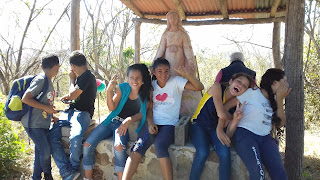I had the greatest
opportunity to go down to El Salvador for the very first time to learn
about
the current battles and victories involving economic, social, environmental and
agricultural issues. I have to thank Zulma from U.S Sister Cities - El Salvador
for her
moving presentation on the current issues in El Salvador. I also have
to thank Victor for
planning such an amazing and informational delegation, and
most importantly I would
like to thank all of the communities, and especially
my host families for welcoming me
(and the other delegation members) into their
beautiful homes.
Being in El Salvador for
less than two weeks flew by quickly but in that little amount of
time, I
learned so much. I learned more about the country’s past than I ever would have
in a book, the current struggles but I also learned the battles won, and how
motivated
the people of El Salvador are. In that short time, I also fell in
love with the country, the
landscapes and especially the people. While
there, what struck me was the
overabundance of youth involvement. It was truly
great to witness.
To be honest, when I signed
up for the delegation I thought I would be doing hands on
work in El Salvador
but after spending some time in El Salvador, I realized that the act of
solidarity is stronger than the act of trying to be charitable. Everyone that I
met on the
delegation were truly strong, inspirational and extremely motivated
people. I (along with
the delegation) visited many communities, from Guarjila ,
San Jose Las Flores, Aracato,
to Carasque, and many more. We visited many
communities and their projects, which
were absolutely amazing! From the bamboo
project in Las Flores, to the composting
projects, and reforestation projects
and the women initiatives. All of the projects were
incredible. It was so great
to see the empowerment of women and youth in the
communities as well as the
great organization and the strong unity of all of the
communities we visited.
It was also an honor to meet with many great organizations like
MOPAO (Popular
Movement for Organic Agriculture), CRIPDES and many more. It was
amazing
to hear and learn about the great projects that are in store for the next
couple
of years.
While there were so many
things that really stuck with me on this trip, there was one
part of the
delegation that really hit me and it was standing on top of the hill of the
virgin of the resistance because of its extreme significance with the
resistance of mining.
The symbol of hill honestly speaks for itself and the
people’s fight against mining. It
made me realize that resistance is power. If
it wasn’t for those people in the San Jose Las
Flores standing up for their
rights and environment, the mining company would have
won, but it was the
community’s persistence and energy that won the battle. There have
been many
battles won against mining, one of the most recent one being Cinquera
municipality in
Cabañas, which is now the fifth territory free of mining. (Yay!) Though
there have been many victories,
there are unfortunately still many battles to be won and
though there are still
many battles to be won, it’s certain that there is no stopping the
people of El
Salvador from winning those battles especially those against mining and the
use
of agrochemicals, I also know for certain that I will forever stand in
solidarity with
There are so many places,
and people that I didn’t mentioned in this small reflection but
know that every
part of this delegation influenced me in such a profound way. El Salvador
is
such a beautiful country, and people, both beautiful inside and out. Once
again, thank
you to everyone who welcomed the delegation and me with open arms.
Forever in Solidarity,
Justina





